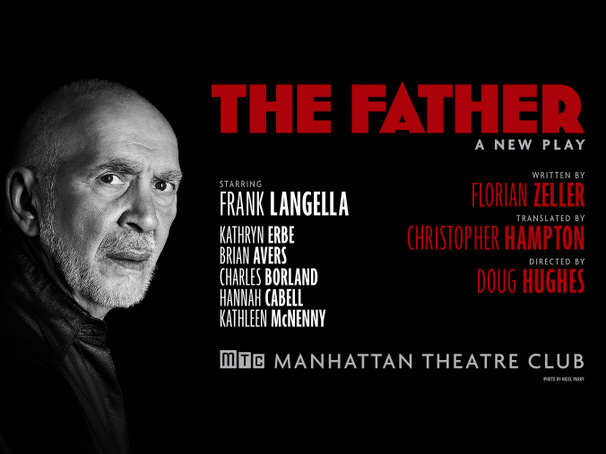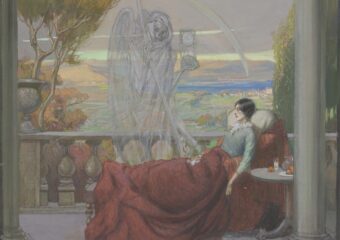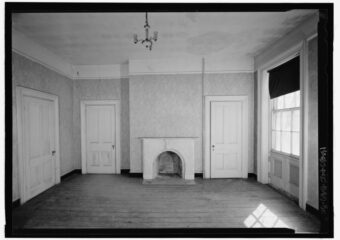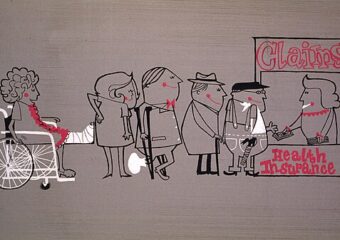Playwright: Florian Zeller
Director: Doug Hughes
Performance venue: Manhattan Theater Club at the Samuel J. Friedman Theater in New York City
Run time: 90 minutes
According to the Art:
Through an interplay among set designs, lighting effects, repeated scene sequences, and time loops, this play gives the audience a sense of the dementia experience, not just a view of it. The audience at times has as much trouble as the character with dementia discerning fact from fiction, past from present, and here from there.
Synopsis:
The Father is the story of an older man with Alzheimer’s disease (André) and his progression through first living on his own, then living with his daughter (Anne), and finally living in a nursing home. Or, is it? It’s hard to tell, and that is the intention of the playwright, Florian Zeller, who told The Guardian (2015), “The Father is about an old man lost in the labyrinth of his mind.” The objective of the play is to bring audience members into the actual dementia experience so that rather than witnessing André’s disorientation they feel his disorientation.
The director, Doug Hughes, creates the audience experience through an interplay among set designs, lighting effects, repeated scene sequences, and time loops as contexts for various symptom manifestations like memory loss, paranoia, anger, and lasciviousness. All the scenes take place in one room that serves at different times as André’s flat, Anne’s flat, and a nursing home room. The furnishings of the room change based on the supposed setting, but the walls are exactly the same for all of them. In different scenes, André is not always sure where he is, and neither is the audience.
Early in the play, André hears Anne tell him she’s relocating from Paris to London with her lover, but she is present to him in most of the scenes thereafter and until the end of the play when he’s told by a nurse that Anne had moved to London some time ago. Had she really left Paris and was never actually there in all those other scenes? He wonders and so does the audience. In other scenes, the way characters from the past and present enter and exit distorts time for André, and so while audience members know the linear trajectory of the disease course, they can’t be sure of where they are in that course during a given scene. With the last scene taking place in André’s nursing home room with the same walls seen in his flat and Anne’s flat, the audience can’t be faulted for wondering whether all that came before was just one of André’s hallucinations.
The play does not keep audience members in a perpetual state of confusion and despondency. Farcical elements are peppered throughout that produce occasional laughs, such as when Anne contests André’s account of a previous conversation, he suggests it’s she who has the memory problem: “You’ve forgotten. Listen, Anne, I have a feeling you sometimes suffer from memory loss. You do, I’m telling you. It’s worrying me. Haven’t you noticed?”
Analysis:
If this play had been staged as the customary audience view of outside looking in, the audience would have merely witnessed the familiar manifestations of Alzheimer’s disease and a familiar progression of events. This view would have afforded a new appreciation for the trauma it causes to those who are not closely acquainted with the symptoms of Alzheimer’s, while those who are very familiar with them could possibly achieve a measure of catharsis. Zeller endeavors to do much more by offering a view of Alzheimer’s from the inside looking out and a means to grasp the actual experience of it. He is successful when audience members find themselves working as hard as André is to discern fact from fiction, past from present, and here from there.
This can be no easy feat for the stage, and no wonder then that the production team enlisted an “illusion consultant” (Jim Steinmeyer) and a medical advisor (Dr. Randi Diamond). The intimate experiences the actor playing André (Frank Langella) and the director (Doug Hughes) have had with Alzheimer’s disease through family members no doubt contributed to the production’s authenticity as well.
Zeller doesn’t leave the audience members defenseless in their efforts to orient themselves. He associates André’s grasp of his own situation with the whereabouts of his watch: “I need to know exactly where I am during the day. I’ve always had this watch, you know. If I were to lose it, I’d never recover.” As André’s dementia progresses and his powers of perception weaken, we see fewer objects in Anne’s flat. In the end, Zeller is hoping that confusing and disorienting the audience members will clarify the dementia experience for them.
Also:
This review is based on a live performance presented by the Manhattan Theater Club at the Samuel J. Friedman Theater in New York City that ran between April and June of 2016. The play was nominated for a 2016 Tony Award for best play, and Frank Langella won the 2016 Tony Award for best performance by an actor in a leading role in a play. In supporting roles were Kathryn Erbe, Brian Avers, Charles Borland, Hannah Cabell, and Kathleen McNenny.
Translated from French by Christopher Hampton.
Zeller made the play into an Academy Award winning movie in 2021, which I cover here.
A version of this review is posted here on the NYU Literature, Medicine and Arts Database.
This play is featured in an episode of the affiliated podcast, The Clinic & The Person: He Wants to Itch at It: A Novel, A Play, and a Movie Imagining Dementia.



